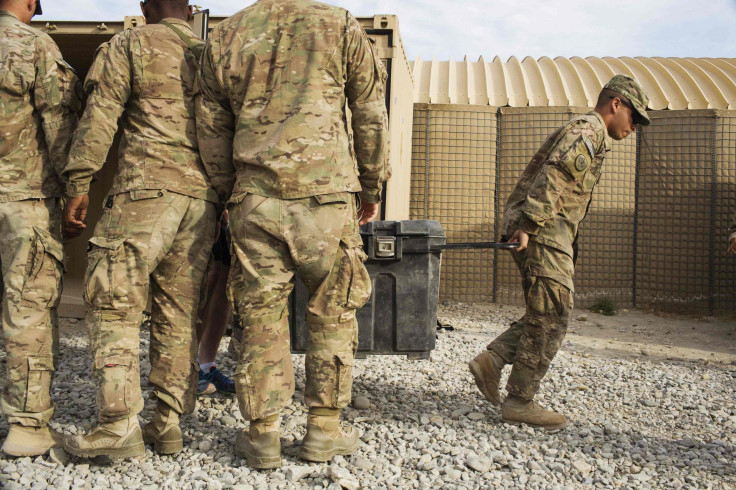U.S. And NATO End Combat Mission In Afghanistan As Taliban Attacks Intensify

The U.S. and NATO officially ended their combat mission in Afghanistan Sunday after more than 13 years. The war in Afghanistan, led by the U.S. and NATO, started in December 2001 in the aftermath of the 9/11 attacks and ended with a ceremony in a basketball gym in Kabul.
"On this day we give thanks to our troops and intelligence personnel who have been relentless against the terrorists responsible for 9/11--devastating the core al Qaeda leadership, delivering justice to Osama bin Laden, disrupting terrorist plots and saving countless American lives," U.S. President Barack Obama said in a statement issued by the White House Sunday. "We are safer, and our nation is more secure, because of their service."
In his Christmas address, Obama said the change in mission marked the end of the war in Afghanistan for America, but that involvement in the country would continue.
NATO Secretary-General Jens Stoltenberg said in a statement the security of Afghanistan "will be fully in the hands of the country’s 350,000 Afghan soldiers and police. But NATO allies, together with many partner nations, will remain to train, advise and assist them.”
The International Security Assistance Force (ISAF), the NATO force that fielded U.S. troops in Afghanistan, will be replaced with the smaller force agreed upon in the two security pacts. The ISAF was created by the United Nations Security Council in 2001 and was given the responsibility of training the Afghan security forces, as well as rebuilding key government institutions. Now, that mission has changed.
The force was 130,000 troops at its peak during President Obama’s surge in 2010-11, but it gradually shrank in recent years as Afghan police and soldiers began to take over responsibility for security.
The smaller force will focus on counterterrorism and training Afghan security forces. About 18,000 troops will stay in Afghanistan per the terms of the two security pacts the Afghan government signed with the U.S. and NATO in September.
The end of the NATO mission in Afghanistan comes at a time when the Taliban, which was ousted from power 13 years ago, is re-emerging with a vengeance.
In recent months the Taliban has conducted several deadly attacks on government military forces and the civilian population. The death toll in Afghanistan this year is the highest ever for Afghan forces, who suffered more than 4,600 deaths.
Critics of the U.S. administration have said Afghan forces are not ready to secure the country and stave off the Taliban, and fear what happened in Iraq after the U.S. troop withdrawal will happen in Afghanistan.
Yet the Wall Street Journal reported Afghan police and soldiers carried out 90 percent of military operations this year and prevented the Taliban from gaining new ground. Still, Afghan forces face major obstacles as they move forward with their new roles. The biggest barrier is the lack of airpower.
Meanwhile, the country is unstable politically. It still does not have a cabinet despite Ashraf Ghani being sworn in as president more than three months ago.
© Copyright IBTimes 2025. All rights reserved.





















